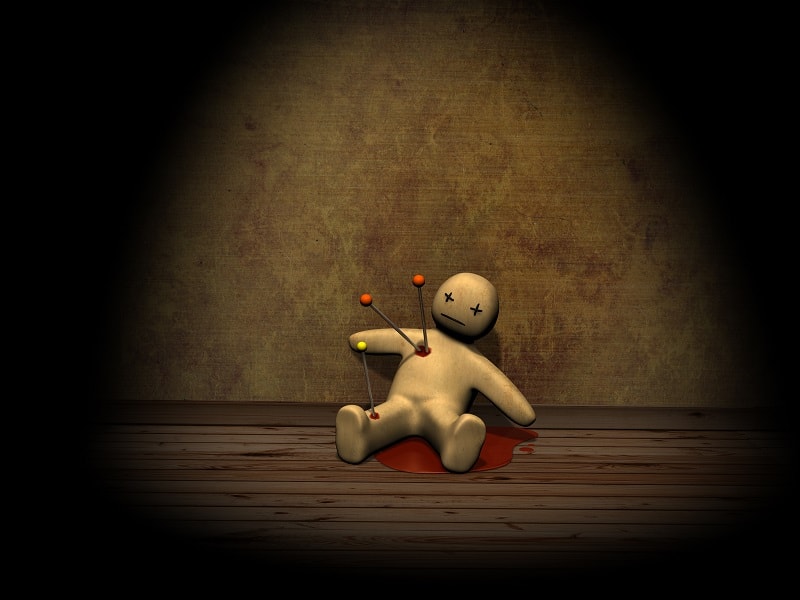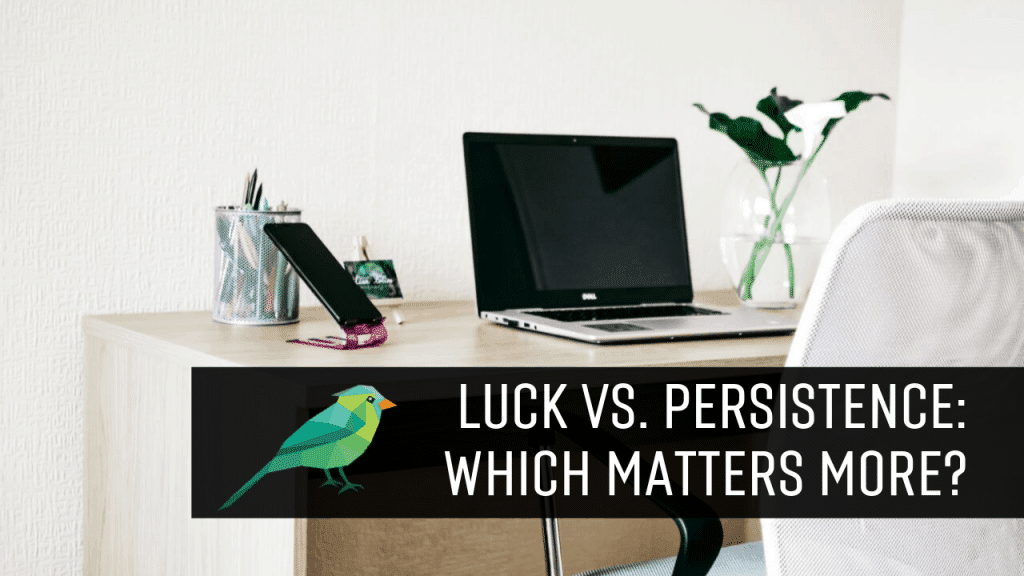We may earn money or products from the companies mentioned in this post.
I've been self-employed and working online for more than a decade now, and I've had the opportunity to know and work with a lot of people who were striving to do the same thing – some more successfully than others. At a recent event, I found myself talking with one of those unsuccessful strivers, and he asked a question that surprised me.
After explaining that he'd tried dozens of different money-making ideas over the years and never had any real success, he asked,
“So what do you think – is it luck, or is it persistence that defines the successful?”
He went on to mention an acquaintance who'd started trying years after him, only to find success in less than a year's time. He was confused and more than a little jealous. After all, he'd been at it for years – working in digital marketing as a day job, buying all manner of information products, testing different things, and getting very little in return. In contrast, his acquaintance bought just one course, and made only two websites before she started earning enough to justify leaving her day job.
Table of Contents
Surely, this affiliate marketing and blogging stuff was all down to luck, right?
Wrong. Though my on-the-spot answer left a little to be desired, I've given this a lot of thought since that conversation happened.

The Impact of Luck
First off, I don't want to discount the impact of luck. Luck absolutely does matter, particularly in the short-term. Aside from the luck that's already baked into your situation – things like genetics, upbringing, and family wealth – there are all kinds of little things that impact your ability to find success quickly.
- Maybe you're one of those lucky folks whose passions translate easily into a niche that makes money. While virtually any niche can get you to the $1-5k/month mark, some are inherently limited, and some will take a lot more work to reach even those relatively low numbers.
- Perhaps an influential blogger or podcaster happened to find you, loved your content, and immediately told everybody about it. Two people could be working equally hard and creating equally great content, but the one who has that extra little boost takes off while the other languishes in obscurity – maybe forever.
- Maybe you got into something right before it blew up, and you just happened to be in the right place at the right time to cash in.
I've never been that lucky person.
When I started consulting, I pitched dozens of clients before I got so much as a nibble. My highest-paying, longest-lasting client actually REJECTED me in favor of another provider at first. The same was true for blogging and affiliate marketing. I've built literally hundreds of sites over the years, and most never went anywhere. None of them blew up immediately.
You don't need to have some big, lucky event to be successful. Even if you DO have some wild stroke of luck, it doesn't mean you'll be successful in the long-run. In fact, a lot of people get themselves in trouble with too much luck, too soon. It can lead you to believe things will always be easy, or cause you to double-down on something that was just a passing fad. It makes it a little harder to develop the solid work ethic that'll make your success last.

If you start off emailing 4 people and landing 3 clients, you're gonna get really frustrated if you then go on to email 40 people and get none – but it can be like that sometimes. Similarly, if you start a blog, write three posts, and immediately see one go viral and end up all over social media and the NY Times, it's easy to let yourself think, “Wow, the world is finally recognizing my genius. Surely it will ALWAYS be like this!”
But guess what? People have short attention spans, and you could spend your next 20 or 30 posts trying and failing to recapture the magic. Depending on your tolerance for frustration, you might not even last that long. Instead of focusing on slowly building your brand and presence, you'll be pursuing that quick fix.
If you're fortunate enough to have a lot of luck at the beginning of a new venture, don't let it go to your head or give you unreasonable expectations about the future. Enjoy the boost, but stay focused on steady effort and growth.
It's highly unlikely you'll be lucky every single day of your career – and if you ARE that kind of lucky, forget about blogging or consulting or affiliate marketing and get yourself over to Vegas or Wall Street. If you want long-term success in anything, what you really need is persistence. Not just any persistence, either. You need smart persistence.
What's Smart Persistence and Why Does it Matter?
Just as I've known plenty of people who fell prey to early luck and poor work ethic, I've known plenty who had all kinds of persistence but no thought behind it. To illustrate the difference, let's look at three very persistent bloggers, Colin, Brodie, and Hamish. None of them are spectacularly lucky. One night, they get together at a pub and decide to start blogs so they can quit their lousy jobs.
Colin

Old Edinburgh businesses are one of Colin's great passions. His grandfather always told him stories about running his shoe store a generation ago, and Colin wishes he'd been around to see the city's retail glory days before the internet. He decides to start a blog that features photos and stories of old retailers in Edinburgh.
Colin is EXTREMELY persistent, but sadly, his site doesn't get much traffic. He works at it for entire year, and while it's a wonderful slice of history, he's no closer to quitting his job. Sometimes, he has nagging doubts about whether he picked a good topic, but he knows the importance of persistence and just keeps going.
Brodie
Brodie decides to start a travel blog, but when he doesn't get much traffic after a couple months, he decides the niche isn't big enough and switches to a cooking blog. A few months down the road, he realizes that isn't working, either. At that point, he decides to make a site about online gaming. A year after the initial decision to start blogging, he's working on a new site about real estate investment. He may not be getting anywhere, but he's working awfully hard.
Hamish
Hamish enjoys history, so he starts a blog about the history of Stirling, Scotland – his hometown. A few months in, he notices that while he has a few passionate fans, he isn't getting much traffic. He reads up on blogging and learns about keyword research. The news isn't good. There just aren't that many people searching for in-depth information on the history of Stirling, Scotland.

Though he's disappointed, Hamish uses this newfound keyword research skill to discover that while there aren't a ton of people looking for in-depth details of Stirling's history, there are a TON of people with an interest in history and tourism within Scotland and the broader UK region. He creates a new blog that mixes travel advice and history, re-purposing as much content as possible from his old site.
He continues to blog for several more months, making time to read up on marketing and test various tactics as he goes. Slowly, he starts to notice a growing following on his website and Facebook page. He looks at the people commenting and notices that many are American, Canadian, and Australian. They're people with Scottish ancestry and a desire to be more connected to the land that served as host to hundreds of years of their family history.
With that new information in mind, Hamish creates posts that look into the history of different Scottish surnames and clans. When readers ask about different destinations, he gets the idea to create a few short ebooks about different places in Scotland. They do alright on Kindle, but he thinks he can do better. Next, he tries creating step-by-step itineraries for people who want a DIY trip with real local tips and none of the time-consuming research it usually takes to get that information. His readers love them, with many people buying 3 or 4 as they plan once-in-a-lifetime trips to their ancestral homeland.
His mailing list has been growing steadily, but not as fast as he'd like. He's read about mailing list incentives, so he decides to try giving away a short guide to Scottish tourism as an incentive. Suddenly, he's getting 15 signups a day, a figure that's slowly increasing as he adds more content to the site and Google sends him more organic (free) traffic. A few weeks later, he tries renaming it to “What You Absolutely MUST Know Before Visiting Scotland” and he sees an even bigger increase in signups.
Nine months in, Hamish learns about affiliate marketing and signs up for Amazon Associates. He writes a few posts recommending history and travel books, and sees a few commissions come in. It's good, he realizes, but it could probably be better. By now, he knows his audience pretty well. He knows that many feel a deep connection to Scotland and Britain overall. He knows many, if not most, are planning a trip to Scotland in the near future. He begins to include content that covers must-pack items, Scottish culture, and British television. Commissions increase.

By the one year mark, Hamish is making enough money to replace his day job income. He knows his site will likely see seasonal fluctuations, so he's not ready to quit just yet – but he's well on his way. He's even making plans for his own line of history tours and a second blog once he makes the leap to self-employment. Now that he's learned so much, he feels he'll be able to apply the same tactics to an entirely different niche.
When he and his friends meet up again, they talk about their efforts. Colin and Brodie are blown away when Hamish reveals he's earning a full-time income on his site. They know they've been working really hard, too, so they assume Hamish has gotten lucky.
Persistence vs. Smart Persistence
All three of the men above were persistent. A year in, they were all still blogging. The problem is that two of them weren't practicing smart persistence. Hamish was.
Colin was basically banging his head against the wall over and over. He was totally committed to his blog, but he never stopped to think about whether he put that unwavering faith in the right idea. Brodie was persistent about blogging, but whenever things were slow, he blamed the topic and started over from scratch. He should have attempted to validate that his niche was big enough, then studied others to see how he could adjust his efforts. He also needed a lot more patience. A few months is NOT enough to decide whether a blog is going to work.
Smart persistence means acknowledging you don't know everything going in – but also knowing that you have to start somewhere or you'll never make any progress. The key is to learn as you go and correct course as needed based on the feedback you get from your market.
Smart Persistence for Bloggers
If you're blogging, that means learning more about SEO and social media and keywords and opt-ins and adjusting your strategies based on what works. It might mean changing your entire topic, but it's more likely you'll just need to pivot a bit, or go broader.
Smart Persistence for Freelancers
If you're freelancing, smart persistence means getting out there and pitching and then seeing what happens. Maybe your approach sucks. Maybe you're targeting the wrong kinds of businesses. You might be trying to sell the wrong kind of services. You won't know until you try, though. Different things work for different people.
Learning when to stay on course and when to adjust isn't easy, and it means acknowledging that you might be wrong. It requires a willingness to experiment. For many, it helps to take courses or get a coach.
Getting Back to the Original Question…

If you've made it this far, you probably already know the answer to the original question.
“So what do you think – is it luck, or is it persistence that defines the successful?”
It's persistence by a longshot, but only if it's smart persistence. The guy I was talking to HAD been trying for years, but he never stuck with anything long enough to see it through. When something wasn't working, he didn't stop to think about whether he was approaching it the wrong way, he just scrapped it and started chasing the next big thing.
He was exactly the kind of person who would have benefited GREATLY from a good coach. If someone had been there to spot his patterns and help him correct course on any one of his past projects, he might have been happily self-employed instead of bitter and resentful of someone else's success.

